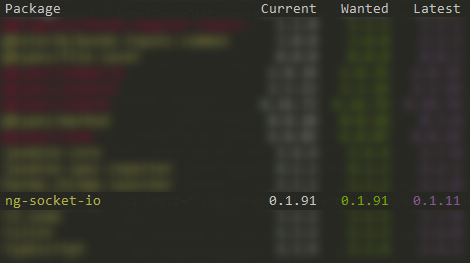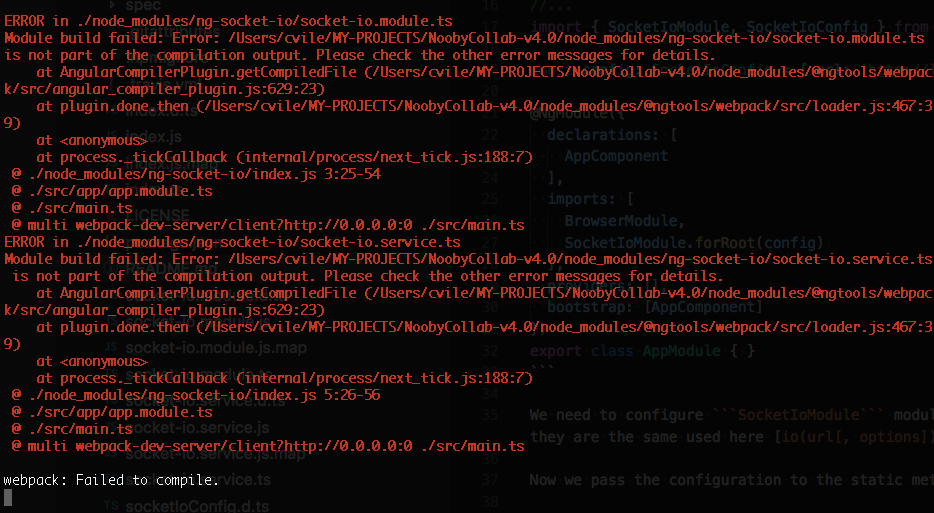Socket.IO module for Angular 2 and 4
npm install ng-socket-io
//...
import { SocketIoModule, SocketIoConfig } from 'ng-socket-io';
const config: SocketIoConfig = { url: 'http://localhost:8988', options: {} };
@NgModule({
declarations: [
AppComponent
],
imports: [
BrowserModule,
SocketIoModule.forRoot(config)
],
providers: [],
bootstrap: [AppComponent]
})
export class AppModule { }We need to configure SocketIoModule module using the object config of type SocketIoConfig, this object accepts two optional properties they are the same used here io(url[, options]).
Now we pass the configuration to the static method forRoot of SocketIoModule
The SocketIoModule provides now a configured Socket service that can be injected anywhere inside the AppModule.
import { Injectable } from '@angular/core';
import { Socket } from 'ng-socket-io';
@Injectable()
export class ChatService {
constructor(private socket: Socket) { }
sendMessage(msg: string){
this.socket.emit("message", msg);
}
getMessage() {
return this.socket
.fromEvent("message")
.map( data => data.msg );
}
}In this case we do not configure the SocketIoModule directly using forRoot. What we have to do is: extend the Socket service, and call super() with the SocketIoConfig object type (passing url & options if any).
import { Injectable, NgModule } from '@angular/core';
import { Socket } from 'ng-socket-io';
@Injectable()
export class SocketOne extends Socket {
constructor() {
super({ url: 'http://url_one:portOne', options: {} });
}
}
@Injectable()
export class SocketTwo extends Socket {
constructor() {
super({ url: 'http://url_two:portTwo', options: {} });
}
}
@NgModule({
declarations: [
//components
],
imports: [
SocketIoModule,
//...
],
providers: [SocketOne, SocketTwo],
bootstrap: [/** AppComponent **/]
})
export class AppModule { }
Now you can inject SocketOne, SocketTwo in any other services and / or components.
Most of the functionalities here you are already familiar with.
The only addition is the fromEvent method, which returns an Observable that you can subscribe to.
Takes an event name and callback. Works the same as in Socket.IO.
Takes an event name and callback. Works the same as in Socket.IO.
Takes an event name. Works the same as in Socket.IO.
Sends a message to the server. Optionally takes a callback. Works the same as in Socket.IO.
Takes an event name and returns an Observable that you can subscribe to.
Takes an event name, and returns a Promise instead of an Observable.
Works the same as once in Socket.IO.
You should keep a reference to the Observable subscription and unsubscribe when you're done with it.
This prevents memory leaks as the event listener attached will be removed (using socket.removeListener) ONLY and when/if you unsubscribe.
If you have multiple subscriptions to an Observable only the last unsubscription will remove the listener.
You can also see this example with express.js.
import { BrowserModule } from '@angular/platform-browser';
import { NgModule } from '@angular/core';
import { AppComponent } from './app.component';
import { SocketIoModule, SocketIoConfig, Socket} from 'ng-socket-io';
const config: SocketIoConfig = { url: 'http://localhost:8988', options: {} };
@Injectable()
class ChatService {
constructor(private socket: Socket) { }
sendMessage(msg: string){
this.socket.emit("message", msg);
}
getMessage() {
return this.socket
.fromEvent<any>("message")
.map(data => data.msg );
}
close() {
this.socket.disconnect()
}
}
@NgModule({
declarations: [
AppComponent
],
imports: [
BrowserModule,
SocketIoModule.forRoot(config)
],
providers: [ChatService],
bootstrap: [AppComponent]
})
export class AppModule { }MIT




